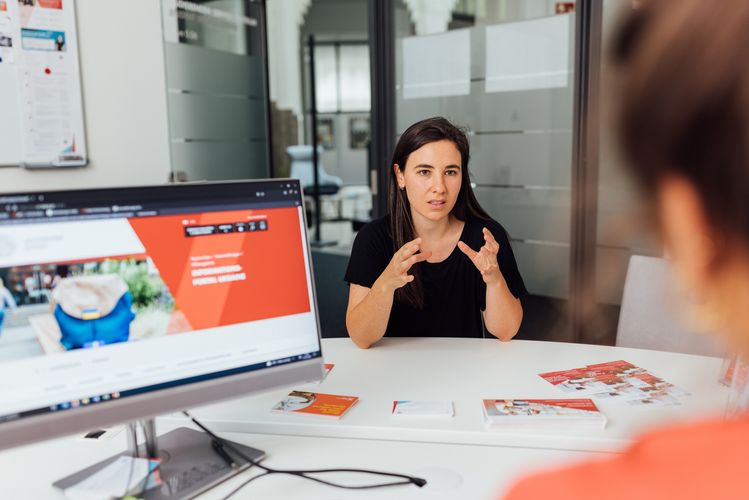How have your work and responsibilities changed since 24 February 2022?
Helen Matthey: In terms of content, the tasks on my desk haven’t really changed much since I’ve been advising prospective students with refugee status on beginning their studies at the University for more than five years now, and in the same time span I’ve also organised the preparatory German courses for refugees together with my colleagues. Of course, there are always changes and new developments with this type of work; most recently, the changes came with the Temporary Protection Directive being invoked for the first time. This was implemented in Germany through Section 16 of the German Residence Act and brought with it a number of changes in terms of residence law.
What has definitely changed a lot since 24 February 2022, however, is the daily workload. In addition to the usual inquiries, there are now, of course, also inquiries from students and prospective students from Ukraine. I would estimate that we have about a third more inquiries than usual, which is noticeable both in our consultations and at our information sessions.
Jana Kuppardt: I would also say that, with the exception of the residence issues that Helen has already mentioned, not much has changed on my desk in terms of content. With social counselling, we always notice relatively quickly when there are trouble spots in the world and when there are refugee movements. In terms of content, for me, this means advising the target group of students and prospective students with refugee status on financing their studies, on questions regarding residence law and on finding housing, as well as helping them with many other social, financial and organisational questions related to studying and starting their studies. I can definitely agree with Helen about the workload because it has really increased significantly. Just how much need there is for advisory services became clear to us again at the info days for prospective refugee and international students on 13 May. We have been organising the event in partnership with the HTWK and Leipzig University for five years now and have usually had 150–200 guests. But this year there were around 450 who attended. For this and other reasons, we have offered additional online information sessions for Ukrainians and third-country nationals from Ukraine who are interested in studying here.
- "In particular, in the case of students in higher semesters whose degree programmes at the University are restricted, it is definitely hard to tell them that because of capacity restrictions their chances of continuing their studies are sometimes very low or even impossible. This is particularly true of the medical subjects."
Helen Manthey
What do you see as the three biggest challenges?
Kuppardt: One of our biggest challenges at the moment is coping with the increased number of requests for advisory services. It is important to remember that students still have a greater need for social counselling as a result of the pandemic, and that people with refugee status from Syria, Venezuela, Afghanistan and Turkey, for example, also have a great deal of interest in studying here. But now there are also inquiries from prospective students and students from Ukraine, which we have to handle with the same staff capacity. This naturally means that the waiting times for an appointment are longer.
On the other hand, it is also a great challenge to keep up to date with the legal situation. In order to be able to provide solid advisory services, we always have to know exactly when regulations or laws change, which is sometimes not so easy on top of the day-to-day consultations, projects and tasks, and is only possible with very good networking.
And we are unfortunately often in the position that we have to deliver bad news. Many people are often unable to gain rapid access to higher education as preparatory courses, language preparation and the application process for a place at the University can take a long time. As a result, once refugees get here, they often have to simply wait. Communicating this is not always easy.
Matthey: I can clarify the last point that Jana just mentioned with an example from our university. In particular, in the case of students in higher semesters whose degree programmes at the University are restricted, it is definitely hard to tell them that because of capacity restrictions their chances of continuing their studies are sometimes very low or even impossible. This is particularly true of the medical subjects.
- "Apart from the advisory services we offer prospective students and students with refugee status, we naturally hear very personal stories ranging from interrupted academic careers to the loss of family members and friends. But we have to try to keep this information as far away from us as possible so that we can continue to provide professional advice and support to those who need it."
Jana Kuppardt
For me, a further challenge in advising students is also the slow pace of political decisions such as legal regulations on the residence of third-country nationals who have had to flee Ukraine and regulations on the recognition of work completed at school and university. These are all aspects that have often left us and many other advisory offices in our network with an unsatisfactory feeling as we have then in some cases for longer periods of time been unable to provide prospective students with solid guidance on their plans for studying.
In addition, I also feel it is very important to continue to be attentive to the needs of other people seeking protection who are also interested in studying – first and foremost, those who have to go through the asylum procedure in Germany and are as such partly subject to different legal conditions. With regard to the shortage of skilled workers, people in this target group, in particular, hold great potential that could be developed much more quickly if they did not face such huge bureaucratic hurdles.
What particular time in your work with Ukrainians particularly touched you and why?
Kuppardt: With regard to February 2022, I believe it was hearing the statistic published by the UNHCR that now with the Ukrainian refugees there are around 100 million people worldwide who are fleeing wars, conflicts and persecution. Apart from the advisory services we offer prospective students and students with refugee status, we naturally hear very personal stories ranging from interrupted academic careers to the loss of family members and friends. But we have to try to keep this information as far away from us as possible so that we can continue to provide professional advice and support to those who need it. What touches me again and again is the indomitable willpower and courage that the refugees have to start a new life here in Germany or specifically in Leipzig.
Matthey: I feel the same way as Jana. I also find it incredibly shocking how many people around the world have to flee their country of origin or place of residence. Even if only to a limited extent, here at Leipzig University, we experience the effects of this relatively quickly at the working level as a result of the increased requests for advisory services. For us, it is important that we can provide those arriving the best possible advisory services and information on how they can start or continue their university education and support them, for example, through our preparatory German courses that help prepare them for their studies.
I was particularly touched, or rather happy, by the fact that in February the internal and external network which we have enjoyed working with for many years was quickly reactivated even after the online coronavirus phase and that the important work it has been doing for many years is once again visible. Comprehensive advisory services can only be provided when the expertise of the various offices are brought together.




Comments
No comments found!